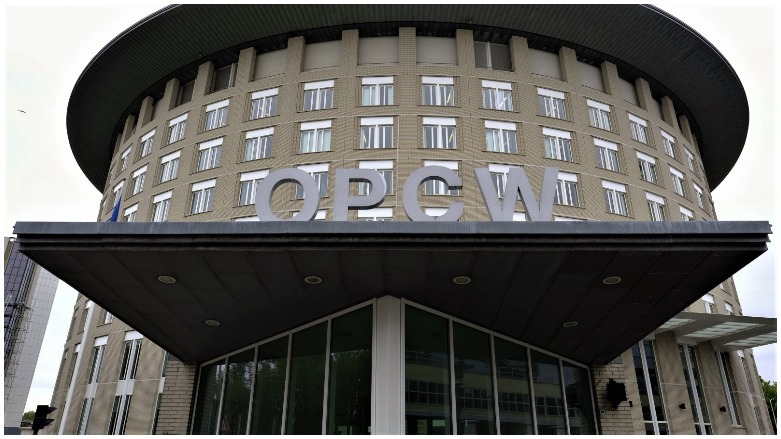US hails OPCW condemnation of Syria’s use of chemical weapons

WASHINGTON DC (Kurdistan 24) – “The United States is applauding the Executive Council of the world’s chemical weapons watchdog, the Organization for the Prohibition of Chemical Weapons (OPCW), for its adoption today of a decision that condemns Syria’s use of chemical weapons,” State Department Spokesperson Morgan Ortagus said in a statement issued on Thursday.
Earlier on Thursday, the OPCW’s Executive Council overwhelmingly voted to censure Damascus for using the banned weapons against its own citizens.
France proposed the motion, and of the 41-member Executive Council, only three countries—Russia, China, and Iran—opposed it.
The statement from the Executive Council affirmed that the Syrian regime was responsible for the use of chemical weapons in Ltamenah on three occasions in March 2017.
This marked the first time that the Executive Council has identified a party behind the use of such weapons. Previously, the OPCW was only authorized to determine whether chemical weapons had been used or not. Even if it determined such weapons had been used, it did not have the authority to identify which party had done so.
That changed, however, in 2018, when a new OPCW body of inquiry was established: Investigation and Identification Team (ITT), and the OPCW was given a mandate for determining responsibility for a chemical weapons attack.
The Syrian Regime’s Use of Chemical Weapons
In April, the ITT issued a report on the Syrian regime’s suspected use of chemical weapons in Ltamenah, a town of some 17,000, some 40 kilometers north of Hama, which was in rebel hands in the spring of 2017.
The ITT concluded that a Syrian Su-22 flying out of Shayrat airbase, about 120 kilometers south of Ltamenah, dropped a bomb containing sarin gas on the town on March 24, 2017.
The following day, a helicopter flying out of Hama airbase dropped a cylinder containing chlorine gas.
“The cylinder broke into the hospital through its roof, ruptured, and released chlorine [gas], affecting at least 30 persons,” the ITT report stated.
On March 30, a Syrian Su-22, again flying out of Shayrat airbase, dropped another bomb containing sarin gas in Ltamenah, the ITT stated.
Syria’s use of chemical weapons in March 2017 exposed the failure of a weapons destruction agreement reached four years earlier, following the regime’s use of a highly lethal nerve agent.
In August 2013, Syria dropped sarin gas in areas near Damascus under rebel control. Some 1,500 Syrians were killed in the assaults on Eastern and Western Ghouta, including over 400 children, the US charged.
Along with France, the US threatened to respond militarily, but Russia intervened with a proposal that Syria would destroy its chemical weapons, to which Damascus agreed.
The destruction—or what was supposed to be the destruction—of Syria’s chemical arsenal was carried out over the following year, under OPCW supervision.
Yet Syria secretly kept some significant part of its arsenal. Following the March 2017 attacks on Ltamenah, another chemical attack occurred on April 4, 2017, on the town of Khan Sheikhoun, in Idlib province.
This time, the US responded militarily—with a cruise missile strike three days later on Shayrat airbase.
The Kurdistan Regional Government (KRG) condemned the Syrian chemical attack, while it expressed the “hope that the measures taken by the US forces in Syria will prevent such crimes from being committed again.”
Read More: KRG hopes US strikes prevent re-use of chemical weapons
Yet it was not all that long before the regime, again, began to use chemical weapons. Following a chemical attack on the Damascus suburb of Douma a year later, in 2018, the US, France, and UK, launched an assault that targeted three sites in Syria associated with the regime’s chemical weapons program.
Read More: Pentagon explains Coalition strikes on chemical facilities in Syria
OPCW Demands Full Accounting of Syria’s CW Program
In Thursday’s decision, the OPCW’s Executive Council gave Damascus 90 days to declare all aspects of its chemical weapons program, including “where the chemical weapons, including precursors, munitions, and devices used in the 24, 25, and 30 March 2017, attacks were developed, produced, stockpiled and operationally stored for delivery.”
It also “reaffirmed that those individuals responsible for the use of chemical weapons must be held accountable” and brought to justice.
The Executive Council will report on Syria’s response at the annual meeting of the full OPCW in November. If Damascus does not comply, the OPCW could refer the matter to the UN Security Council for possible economic sanctions.
Russia, most probably, would veto any measures in the Security Council that punished Syria. Nonetheless, the US, European Union, and other concerned countries could coordinate among themselves in imposing penalties outside of the UN format.
Editing by John J. Catherine
